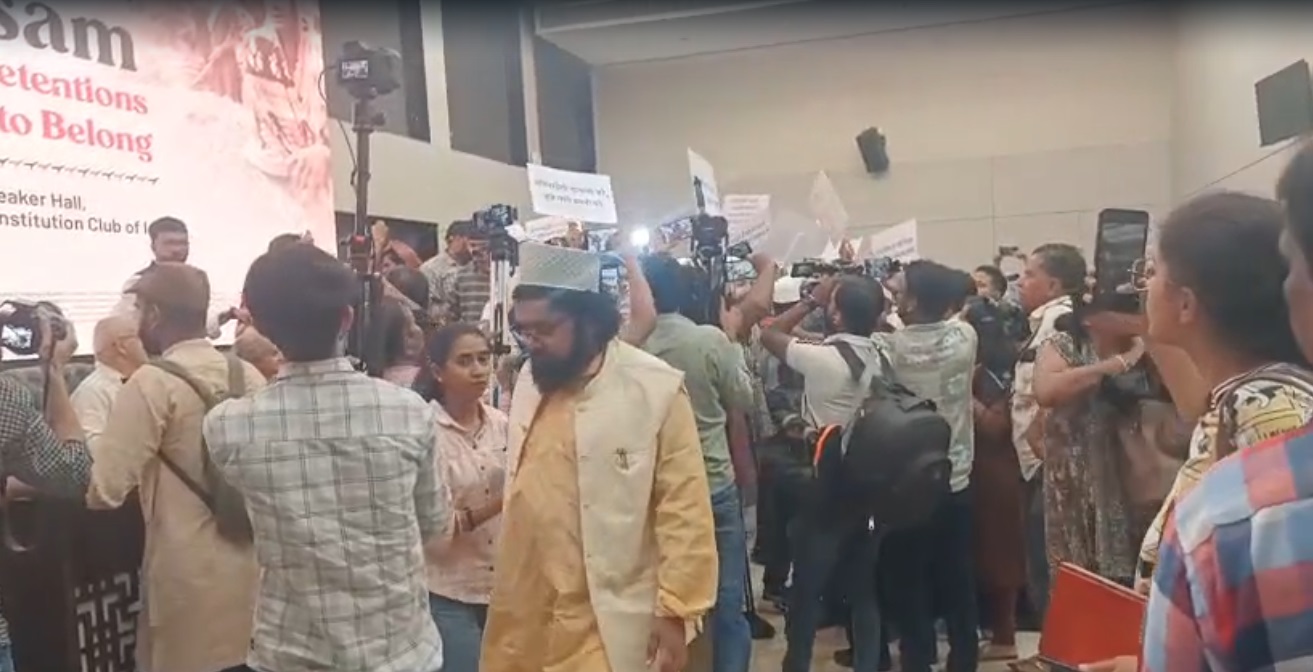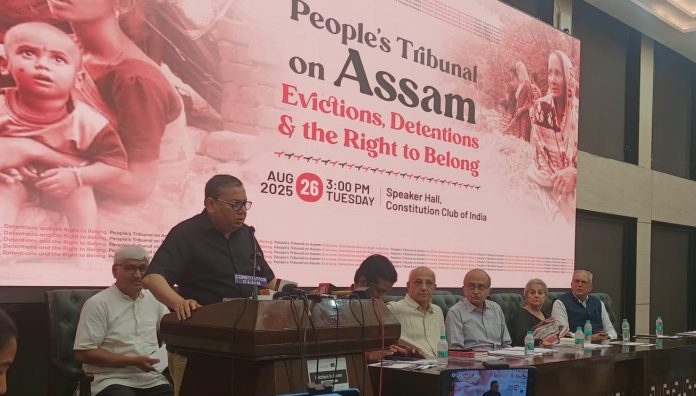New Delhi: The release of a People’s Tribunal Report on Assam’s evictions and detentions was disrupted this week at the Constitution Club when a group of intruders stormed the hall with slogans. The disruption, though unsettling, drew attention to the very issues the report highlighted: the shrinking of democratic space and the targeting of minorities in Assam.
The report, titled “Evictions, Detentions and the Right to Belong,” documented large-scale demolitions, forced displacements, and ongoing intimidation faced by Muslim families in Assam. It was prepared after a field visit to Guwahati, Goalpara, and Kamrup districts earlier this month.
Justice Iqbal Ansari, former Chief Justice of Patna High Court, presided over the session. He said the disruption symbolized India’s deepening democratic crisis. He reminded the audience that fundamental rights apply to all persons, citizens and non-citizens alike. Referring to his years of service in Assam, he warned that arbitrary evictions, detentions, and disenfranchisement undermine constitutional principles. He called on society to imagine itself in the place of victims in order to understand the gravity of injustice.
Harsh Mander, activist and former IAS officer, described Assam as a state where fear and injustice dominate daily life. He said families have been evicted without notice and forced into temporary shelters during monsoons. He spoke of detention centers where people are held for years because of clerical mistakes in NRC documents. According to him, entire families are condemned to separation and despair for minor errors such as spelling mistakes. He added that the demolition of over 1,600 homes during the rainy season without rehabilitation amounted to collective punishment.
Former Planning Commission member Syeda Hameed said the trauma of Assam’s Muslims echoed the pain of Partition. She said the word “Bangladeshi” has been turned into a curse and used to humiliate entire communities. She described the situation of women and children displaced from their homes as “blood-curdling” and urged citizens to stand for compassion and solidarity.
Imtiaz Hussain of the All Assam Minority Students’ Union (AAMSU) accused the government of using evictions as a political weapon. He said in many villages Muslim homes were demolished while Hindu-majority areas were spared. He cited cases where people were declared foreigners despite holding valid documents.
Researcher Fawaz Shaheen of the Association for Protection of Civil Rights (APCR) listed major eviction drives this summer. He said 680 families were evicted in Hasila Beel on June 16 with only 48 hours’ notice. He noted that schools, Anganwadis, and mosques were demolished and families were forced to live under tarpaulin in the rains. On July 12, 1,084 families were evicted in Ashudubi despite a pending High Court case and land records dating back to 1948. During protests, police firing killed a 19-year-old youth, Sakowar Ali. On August 23, 105 shops were demolished in Rakhasini even though stay orders were pending in court.
All these families were Muslim, many of them with voter lists, land records, and NRC inclusion proving their long presence in Assam. The tribunal team concluded that a climate of fear has been created to stop people from challenging unlawful actions.
Senior advocate Prashant Bhushan connected the evictions to corporate interests. He said lands cleared of Muslim families were being diverted for projects by companies such as Adani and Patanjali. He said rule of law has collapsed in Assam and dissenters are targeted while the media vilifies those who question the government.
Former Union Home Secretary Gopal K. Pillai placed the issue in historical context. He recalled that the 1971 Indira-Mujib Accord shaped migration debates. He revealed that out of the 42 lakh people excluded from the NRC, 26 lakh were Hindus. He said this fact explains why the government has delayed rules for the Citizenship Amendment Act. He warned that exaggerated claims of millions of foreigners are misleading, since the border with Bangladesh is porous and migration has always existed.
The disruption at the Constitution Club lasted only a few minutes, but it left behind a chilling message. Placards accusing organizers of being “anti-national” were waved at the event. Dignitaries, including activists, academics, and victim representatives, were forced into silence before security personnel restored order.
For many in the hall, the disruption reinforced the central concern of the tribunal: that minorities, particularly Muslims, are being branded as outsiders and denied their rights. The eviction drives, detentions, and disenfranchisement are not isolated administrative actions but part of a wider erosion of constitutional values.
The tribunal’s findings and testimonies serve as urgent reminders to the Muslim community and civil society at large. They document not only the unlawful evictions but also the growing intolerance against democratic voices. They highlight the responsibility of citizens to speak out when families with decades of records are denied their place in their own land.
Assam’s evictions and detentions are more than a state-level issue. They raise questions about the future of citizenship, the treatment of minorities, and the space for dissent in India. The testimonies collected by the tribunal are now part of the record. They speak of injustice, fear, and exclusion, but also of resilience and courage in the face of systematic targeting.
The report is an appeal to conscience. It asks whether a democracy can survive when thousands are made homeless, when detention camps hold people indefinitely, and when victims are denied even the right to tell their stories without disruption.





